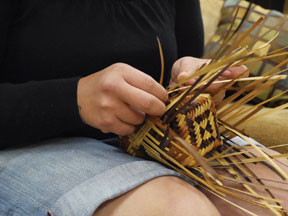
 Smithsonian Traveling Exhibition “Roots of Wisdom” presents Native knowledge and modern science working together
Smithsonian Traveling Exhibition “Roots of Wisdom” presents Native knowledge and modern science working together
A basket weaver from the Eastern Band of Cherokee Indians weaves a river cane basket. The process of harvesting, splitting, dying and weaving river cane requires specialized techniques and lots of practice. (Courtesy Oregon Museum of Science and Industry)
“Roots of Wisdom: Native Knowledge. Shared Science” begins its national tour Feb. 13 at Hale La‘akea Windward Community College’s Library Learning Commons in Kne‘ohe, Hawaii, where it will be on view through May 7. The Smithsonian traveling exhibition explores the ways in which traditional knowledge of indigenous communities and cutting-edge Western science are being applied. The national tour will continue to the Farragut Museum in Farragut, Tenn., June 3 to Aug. 27.
“Roots of Wisdom” explores four inspiring stories of environmental and cultural restoration from the Confederated Tribes of the Umatilla Indian Reservation, Tulalip Tribes, Eastern Band of Cherokee Indians and Native Hawaiians.
The exhibition tells the stories of these communities, giving visitors examples of how traditional knowledge and Western science provide complementary solutions to ecological and health challenges. The stories featured in “Roots of Wisdom” reflect the sacred relationship that each community has with its homeland and pass along knowledge of the environment, history, social values and spiritual beliefs.
Today, the Confederated Tribes of the Umatilla Indian Reservation (Cayuse, Umatilla and Walla Walla) are using their resources to restore waterways and native species in Eastern Oregon and the Columbia River Basin. The Tulalip Tribes of Northwest Washington are rediscovering native foods, raising organic foods and, in the process, reconnecting to native food and traditional medicine plants. In doing so, they combine traditional knowledge and Western science for a more culturally appropriate approach to health care. The Eastern Band of Cherokee Indians is working with scientists and regional groups to restore river cane in its homelands of Western North Carolina. They are also revitalizing cultural traditions that use the cane, such as basket making. And, Native Hawaiians are using traditional knowledge and Western science to restore parts of the land divisions or small communities called ahupua’a (“ah-hoo-poo-ah-ah”), which spanned from mountaintop to the ocean. Although fish-pond restoration is challenging, the work is significant for Hawaiian culture and potentially important for future sustain-able food sources.
“Roots of Wisdom: Native Knowledge. Shared Science” was developed, produced and circulated by the Oregon Museum of Science and Industry, Smithsonian Institution Traveling Exhibition Service (SITES) and the Smithsonian’s National Museum of the American Indian. The exhibition was made possible with funds provided by the National Science Foundation.
SITES has been sharing the wealth of Smithsonian collections and research programs with millions of people outside Washington, D.C., for 65 years. SITES connect Americans to their shared cultural heritage through a wide range of exhibitions about art, science and history, which are shown wherever people live, work and play. Exhibition descriptions and tour schedules are available at sites.si.edu.
The Smithsonian’s National Museum of the American Indian is committed to advancing knowledge and understanding of the Native cultures of the Western Hemisphere—past, present and future—through partnership with Native people and others.
Founded in 1944, the Oregon Museum of Science and Industry (OMSI) is one of the nation’s leading science museums, a world-class tourist attraction and an award-winning educational resource for the kid in everyone. OMSI operates the largest museum-based outdoor science education program in the country and provides traveling and community outreach programs that bring science-learning opportunities to schools and community organizations in nearly every county in Oregon. For general information, call (503) 797-4000 or visit omsi.edu.


Be the first to comment